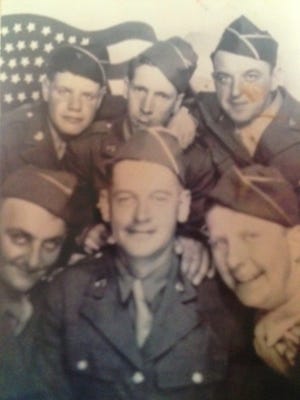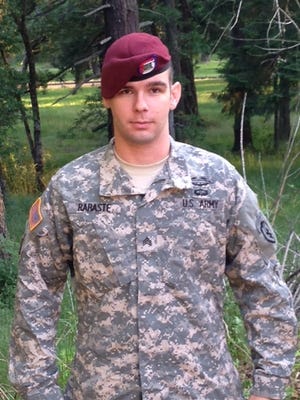source GAIA package: Sx_MilitaryTimes_M6201410306040083_5675.zip Origin key: Sx_MilitaryTimes_M6201410306040083 imported at Fri Jan 8 18:18:17 2016
 As Sgt. Jordan Rabaste jumps with other paratroopers over Normandy this week to mark the 70th anniversary of the D-Day landings, he will remember his grandfather who was there before him.
As Sgt. Jordan Rabaste jumps with other paratroopers over Normandy this week to mark the 70th anniversary of the D-Day landings, he will remember his grandfather who was there before him.
 Rabaste, 28, is with 4th Infantry Brigade Combat Team, 25th Infantry Division, from Joint Base Elmendorf-Richardson, Alaska. He is one of the hundreds of soldiers chosen to take part in the anniversary events in Normandy, France, this week, and the big airborne drop on Sunday.
Rabaste, 28, is with 4th Infantry Brigade Combat Team, 25th Infantry Division, from Joint Base Elmendorf-Richardson, Alaska. He is one of the hundreds of soldiers chosen to take part in the anniversary events in Normandy, France, this week, and the big airborne drop on Sunday.
On the flight to France, he was reading the memoirs of his grandfather, an infantryman and machine gunner at Omaha Beach on D-Day-plus-3: June 9, 1944.
Pfc. Robert Lewis Grant served with Company M, 109th Battalion, 28th Infantry Division, one of the most highly decorated divisions of World War II. The following winter, he fought in the Battle of the Bulge, and later received the Bronze Star for saving another soldier's life and the Purple Heart for his shrapnel wounds.
Jordan Rabaste's visit to France has still more importance to him and his family.
His other grandfather, Jean-Louis Rabaste, was a French Air Force officer, with two sons: Bernard who served in the United States Navy, and Michel, an artillery officer with the French Army before he came to the United States.
Michel Rabaste raised Jordan from the time the boy was 5, and Jordan refers to Michel as his adoptive father.
"He told me his French Boy Scout experiences, his French army officer experiences and his stories inspired me to become a Boy Scout," said Jordan Rabaste, who became an Eagle Scout, and eventually joined the military at age 19.
His appreciation for what his grandfather did came gradually. He had been to the Normandy beaches as a 13-year -old but the significance didn't sink in then.
"At that age not knowing what a deployment was, not knowing military life is, I didn't have a good understanding. My adoptive father tried to explain it to me but I didn't really care to listen," he told Army Times during his journey to France.
On visits to see his Grant grandparents, who lived in New Mexico, he heard stories from his grandfather's' experiences. Grant preferred not to say much, but the young man learned some of what his grandfather had done.
He learned more about the war from his grandmother and from his grandfather's writings.
"Artillery hit at a tent or building where they had ammunition and radios and gear," Rabaste said. "A couple of people got out, but a couple were still in there, so he ran in and grabbed a soldier, brought him and out, then proceeded to go back in for those radios and sensitive items that they needed."
Grant came back with more wounds than his physical ones.
"Looking back now, after three combat deployments, I know what we go through but every day I think about what my grandfather went through. I know it doesn't compare at all," Rabaste said. "We have a decent living, decent enough to make someone happy. "
Grant died while Rabaste was in Iraq.
"I didn't expect it," Rabaste said, describing how a sergeant sat with him while he called his grandmother from Iraq. "I broke down crying because of how strong of a woman she was."
Now a veteran of deployments, husband and father of two children, Rabaste reflects on his family's military history, and wrote an essay about his grandfather, a writer who wrote his own memoir called "Only the Brave."
Rabaste will have the chance to see family members in France, some he's never met. He has relatives there who attend the D-Day anniversary events every year. His adoptive father plans to come this year, as family and friends look forward to a reunion in France, Rabaste said.
He will also have a chance to meet WWII veterans there, and he carries a memory of one such encounter stateside. One day at a Fort Bragg shoppette he talked with two World War II vets, and the veterans thanked him for his service.
"I said, 'No, thank you for your service. If it wasn't for what you did back then I wouldn't be here today,' " Rabaste recalled. "They didn't quite realize, and I didn't tell them my story, about how they actually did really help me be here today."
"They said,'You guys are the greatest generation.'... I don't believe that. They have the greatest generation," Rabaste said. "Nowadays if you put somebody in the cold, they complain. Back in World War II they had frostbite and they kept moving, they kept fighting. There was no going to sick call. They were hard-charging and did what had to be done in order to succeed. Now we have that to a certain extent, but at the same time we have people ready to be more comfortable before meeting the actual mission requirements and before completing the total mission."
"We are the new generation, but I think the World War II and Vietnam era soldiers are the ones to look for in the last 50 years," he said. "I don't think any but a select few could do what they did."





